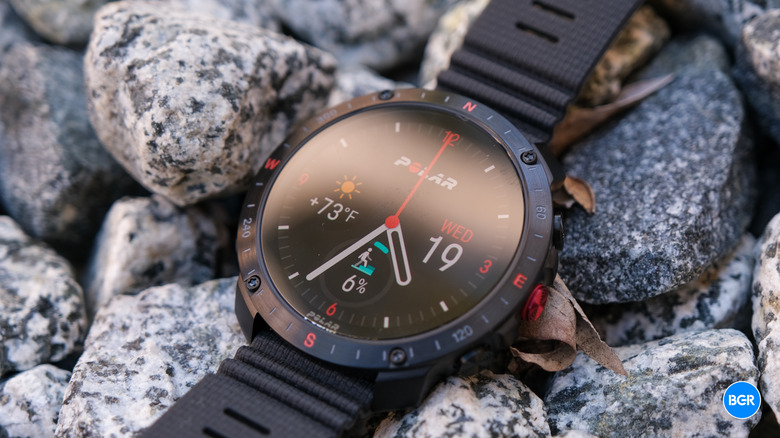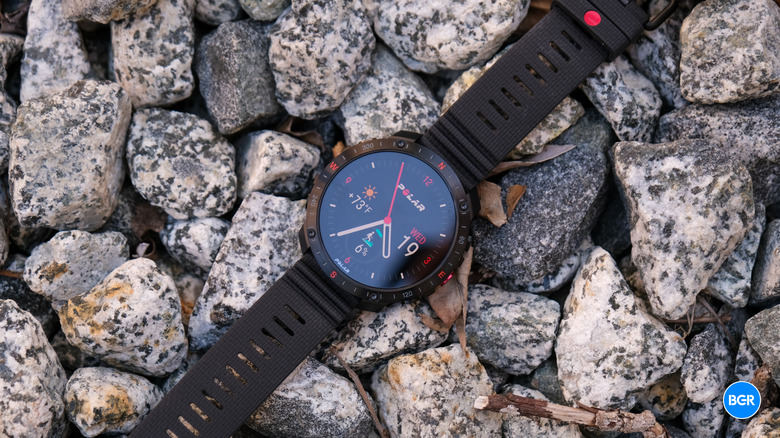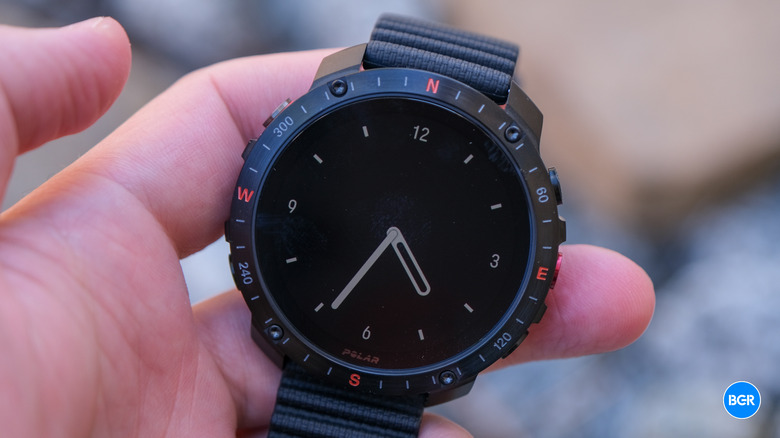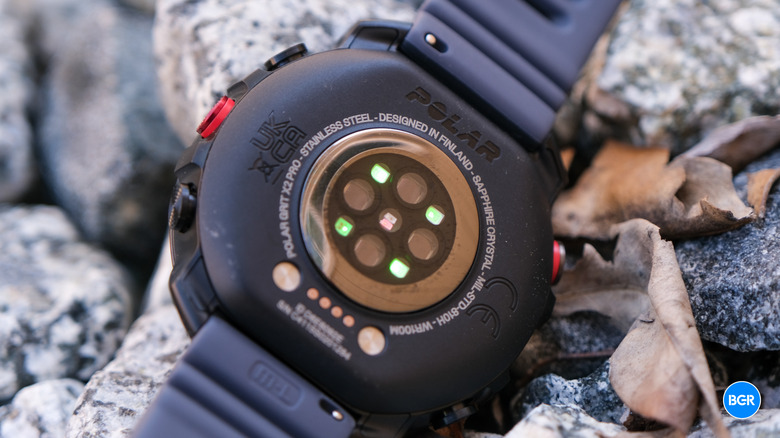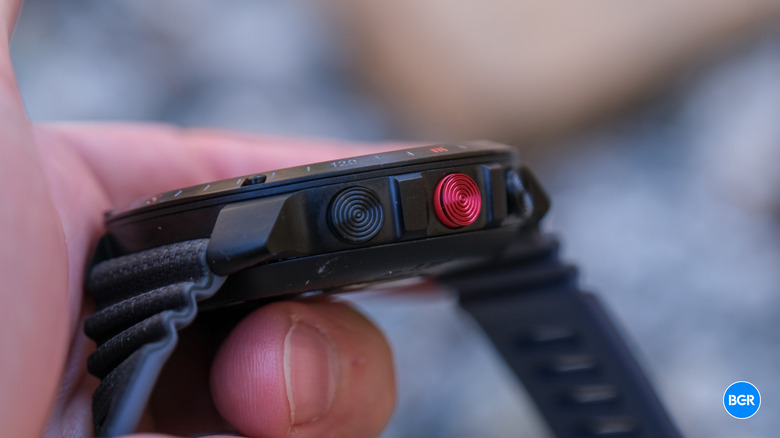Polar Grit X2 Pro Review: Sleek Smartwatch With Tough Competition
- Nice design
- Solid display
- Good battery life
- Helpful mapping features
- Expensive
- Faces tough competition
| Buy From | List Price | Sale Price | |
|---|---|---|---|
| Amazon | $749.95 | $749.95 | See It |
We may receive a commission on purchases made from links.
Apple may be wading into the world of more rugged smartwatches, but it faces tough competition. Plenty of companies have been building excellent rugged smartwatches for some time, targeted specifically at use cases like intense hiking, diving, climbing, and so on. Polar is a great example of this—and its latest multi-sport smartwatch is the Polar Grit X2 Pro.
The Polar Grit X2 Pro offers a clearly rugged design but also looks relatively sleek. It's built to better track all kinds of different sports, but it also has to compete with the Suunto Vertical and the Garmin Fenix 7 Pro.
Does the Polar Grit X2 Pro truly compete, or should you buy an alternative? I've been using the watch for a while now to find out.
Stylish but slightly bulky
You can see straight away that the Polar Grit X2 Pro was built to be rugged — but it avoids looking overly bulky. It's large, to be sure, but it looks relatively premium at the same time, and most in the market for a rugged watch will like the design of the device.
The watch is round, unlike some of the other sports watches out there. It has a 48.6mm case size and is 13.4mm thick. That sounds thick, but considering the overall design and aesthetic, it doesn't necessarily seem overly bulky. It has a stainless steel bezel, and the case is mostly made from bio-based plastic, which is nice.
The watch has buttons dotted around its frame. There are actually five buttons in total: Three on the right side and two on the left. The buttons are easy to locate and press, even when you're wearing gloves, which is nice to see but also necessary for a watch like this.
On the back of the watch can be found the pogo pins for charging, and the health-tracking sensors. We'll get into exactly what this watch can track later.
The Polar Grit X2 Pro comes in two colors—Night Black and Titan (which is essentially silver). There's also a version that comes with an additional strap, but that variant is only available in Titan. I'm reviewing the Night Black model, but based on images I've seen online, I think I prefer the Titan look. Still, the Night Black model, which has red highlights, looks nice.
A crisp and bright display
The display on the Polar Grit X2 Pro looks great. It's touch-sensitive, which helps for certain things, but you can still mostly control the watch through the five buttons.
The display has a 454 x 454 resolution, and it's an AMOLED display. It gets quite bright, and I found that I was even able to see content on the screen outdoors in direct sunlight. The screen is protected by Sapphire glass,
The watch does have an always-on mode, which is handy — however the feature is off by default, so you'll have to dive through the settings to enable it. I recommend most users do so, as the raise-to-wake feature didn't always work very well. The always-on mode does just show a black-and-white clock, but to be fair, seeing the time is probably the most-used use-case for an always-on display anyway.
Mostly quick performance and long-lasting battery
The Polar Grit X2 Pro isn't built to support the same smart features as a device like the Apple Watch. It doesn't need to do the heavy lifting when it comes to things like voice assistants. But it does have to be able to process things like GPS information and mapping, so performance still matters.
Thankfully, I found that the watch was, for the most part, a well-performing device. It didn't often stutter or freeze up, and while it didn't necessarily react to input super quickly all the time, the split second it took to do things wasn't a big issue.
The watch offers a relatively long battery life, and Polar quotes it as offering up to 10 days. However, that will vary a lot depending on features like using the always-on display and how often you use fitness-tracking modes and GPS. Even half that is quite good—and better than many of the more popular smartwatches out there.
Solid health-tracking features
Of course, the biggest reason to buy this watch over others has more to do with its fitness-tracking features than anything else. Thankfully, the Polar Grit X2 Pro offers a range of fitness-tracking features that help make it a great choice in its price range.
First, the basics. The watch has Polar's new Elixir sensor setup, which includes an optical heart rate sensor, a blood oxygen sensor, and a skin temperature sensor, which is used for sleep-tracking. The device also has an ECG sensor, however it's not really there to detect atrial fibrillation, instead collecting data around average heart rate, heart rate variability, and beat-to-beat interval. It's more for general fitness tracking than medical tracking. Previously, some of these measurements required an external heart rate monitor like the Polar H10.
More important than those features, which plenty of watches have, are the new GPS and mapping features. The Polar Grit X2 Pro has a new offline mapping feature, which offers free topographical maps for hiking. The U.S. and Europe are downloaded by default, however you can download additional maps if you need. The device has a dual-frequency GPS, too, which should allow it to better track outdoor activities compared to previous-generation Polar models.
The watch can track a wide range of different activities. There are 150 activities to choose from, but thankfully, you can customize those that show up on your actual watch. These activities include swimming, thanks to the device's WR100 water resistance.
Generally, I found all of these features to work quite well. In particular, I really liked the new mapping features, and found that maps were easy to read. The sleep tracking features were also quite good, showing information like your nightly energy boost from the sleep that you got.
Easy-to-use software
For the most part, the software on the Polar Grit X2 Pro is easy to navigate, though you'll have to get used to it first.
Most of the time, the watch will show the watch face, and you can choose from a number of different designs, with a different number of complications. Complications can show things like the date, weather information, and so on. From that watch face, you can scroll through different tiles around media controls, weather information, navigation, and so on. You can also swipe down to access some quick settings or up to show notifications.
Speaking of notifications, Polar is trying to make its watches a little more like a typical smartwatch—along with media controls. You can set up notifications from the watch itself, but you'll have to decide if that's something you want. It works fine, but obviously, you won't get the same smart features that you'll get on devices like the Apple Watch or Pixel Watch.
The smartphone app is fine, but it's a little dated-looking. Also, I found that syncing between the watch and the smartphone app was often a little buggy.
The Polar Grit X2 Pro now supports importing routes from Strava, which is handy. It's a feature that has been rolled out through a software update to other Polar watches, but still handy for those who use Strava and want a watch to accompany their Strava subscription. You will need a Strava subscription to access the integration, though.
Conclusions
The Polar Grit X2 Pro is really a solid smartwatch for those who want something a little more rugged and built for activities like hiking. However, it's also expensive and, frankly, not as full-featured as some of the competition. If you really like the design and Polar's approach to things like software, this may well be the watch for you — but you'll have to be comfortable spending more than the competition.
The competition
There are plenty of competitors to the Polar Grit X2 Pro. On the smartwatch side, there's the Apple Watch Ultra 2 — which offers more smart features for those who have an iPhone. But even in the realm of rugged smartwatches, there are devices like the Garmin Epix and Vertix 2, which are available at a lower price. There's also the Suunto Race, which is a fair bit cheaper, and the Suunto Vertical, which is a similar price.
Should I buy the Polar Grit X2 Pro?
Maybe, but consider the competition first.
